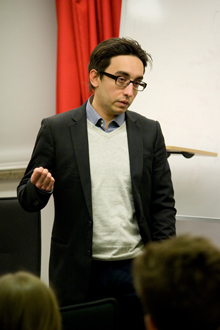
On February 1st, ECLA Professor Bruno Macaes led the first winter term meeting of the Politics Club regarding the Eurozone crisis. Bruno is currently a senior policy adviser to Portugal’s Prime Minister Pedro Passos Coelho and is on leave from his teaching duties at ECLA.
Bruno’s firsthand account of the inner workings of Portuguese politics was perhaps the biggest draw for the audience made up of students, faculty and guests, as Portugal’s national government tries to stave off risks of a sovereign default. More importantly, he provided better insight into the understanding of the financial crisis as the definitive historical moment of the twenty-first century so far.
In comparison to the fall of the Berlin Wall in 1989, which he views as the unwinding of old events reaching as far back as the First World War, and in comparison with 9/11, which he argues was a rearguard movement against modernization in the Arab world, he looks at the financial crisis as a global change in perceptions of power, from what seemed to be a progressive and unparalleled West to something more precarious.
He points out that just years before the financial crisis, China was a common target of critics because of its communist regime. Now, China is lauded as an economic model. The European Union, upon its establishment, was seen as the definitive institution of the continent; five years into the financial crisis, people question whether the Union will survive.
Turning his attention to Greece, he delivered a very brief account of how the heavily indebted country spiraled down to its current state. Having entered the European Union, Greece found it easier to borrow, particularly since investors espoused two important assumptions: that no EU country would default, and that the bigger countries would act as shields from the threat of sovereign default.
Bruno claims that the financial crisis, at its root, is a problem of knowledge. Simply put, financial markets heavily rely on predictions, and when these predictions fail to match reality, it becomes a crisis of knowledge. Knowledge in financial markets interacts with the reality it is supposed to mirror.
With the case of Greece, the perception that its debt level was sustainable did at first help make it sustainable, but this prediction was tested and stretched beyond its scope of validity, so disillusionment came after failure to fulfill the demands of an exploding debt. The challenge now is to find a theory that better accounts for reality when generating predictions.
The discussion turned once more to politics as a student expressed concern about how these indebted EU countries (i.e. Greece, Italy) seem to be held hostage by a supranational institution, overruling their elected democratic representatives and installing individuals who are seen as more capable of implementing solutions to the financial crisis (inching closer to a type of technocracy).
Bruno agrees, but also points out the interesting case of Italy, where Mario Monti now finds more support than the ousted Berlusconi who had survived many scandals during his time as a prime minister. In the case of Portugal, he finds that the notion of a “representative economy” might salvage its representative democracy, coining the phrase “democratize the economy.”
He admits that it is dubious to trust the phrase to shape policy, but it is meant to frame the proposed structural reforms for the country as increasing participation in economic life.
More questions arose regarding the seemingly neo-liberal proposals for Portugal, but as one Professor pointed out—it comes down to the question of whether rationally responsive markets will be the norm of the future or just another bubble, another paradigm.
Though Bruno Macaes himself is uncertain, he believes that the economy should be respected as a separate sphere from the government or the state.
by April Matias (2nd year BA, Philippines)
